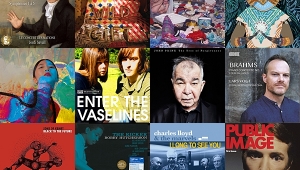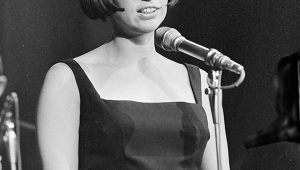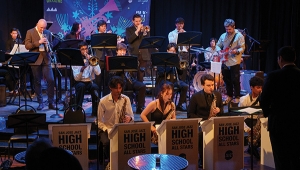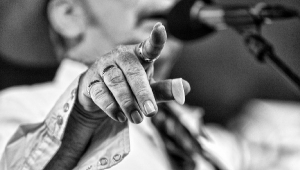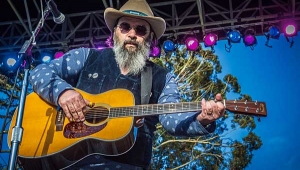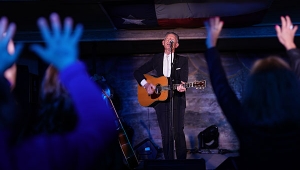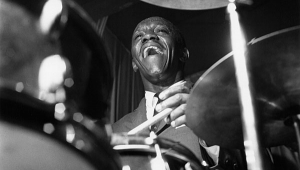| Columns Retired Columns & Blogs |
Frank Zappa on CD (and LP), Part I-III Page 2
The next 21 minutes replicate side 2, and then some, of Roxy & Elsewhere, but at speeds almost double those of Roxy---and those were hardly slow. Schizoid tempo changes and Brock's frenzied sax breaks pervade "Village of the Sun," "Echidna's Arf (Of You)," "Pygmy Twylyte," and "Don't You Ever Wash That Thing?" FZ solos with riveting dramatics on the last, against nightmarishly difficult percussion and bass parts. "Twylyte," taken at half speed, has one of the most lyrical, unironically guitar-slinger FZ solos on record, owing much, alternately, to Hendrix and Clapton. "Room Service," a thrown-together road song obviously never intended for album release but included here as part of the document, has Sly Stone polyrhythms and throwaway lyrics; it's followed by a straightforward "Idiot Bastard Son" and a breathless-sounding "Cheepnis," much inferior to the Roxy version.
The highlight of disc 2 is the 24-minute "Dupree's Paradise," which we've heard before in a chamber-orchestra arrangement, performed by Pierre Boulez and his Ensemble InterContemporain on The Perfect Stranger. This more-than-twice-as-long version has more astounding Duke keyboard work, Brock's taut flute solo, and, those rarities of rarities on Zappa albums, bass and drum solos. The 16-track sound is particularly good in these passages, "live" in all the best ways, the band well placed in the soundstage (kickdrum is right in your lap, though). There's a quiet drum/percussion duet, Thompson and Underwood trading off, with tympani played as you've likely not heard them played before. This gamelan goes on for a good 10 minutes of some of the more intelligent high-energy rock drum improvisation I've heard. Listen, too, to Thompson filling furiously on the traditional Finnish tango "Satumaa."
There follow some brief excerpts from Uncle Meat in essentially unchanged arrangements, and "Montana (Whipping Floss)," so subtitled because a Finn had called out a request for the Allman Brothers' "Whipping Post," of which FZ had, at that point, never heard. (It's since become a standard Zappa encore; see Humor, below.) However, his ignorance of the tune hardly prevented him from rewriting "Montana," on the spot, to include as many references as possible to a whipping post and its paraphernalia.
In a phrase, this is solid music throughout; the CDs of both Vols.1 and 2 are better---fuller, deeper, more "live"---than the few cuts from each excerpted on the Sampler. I couldn't get hold of a copy of the (slightly abridged) 3-LP boxed set of Vol.2 by press time, but I imagine its sound is identical to that of the Sampler.
Guitar, recorded between 1979 and 1984, half-digital, half-analog, all live, all guitar solos, has hardly the variety of Shut Up 'n' Play Yer Guitar, recorded over twice the number of years and with a far greater variety of styles and sidemen. We find here, for the most part, FZ in his heavy-metal guitar maven pose in terms of tone and volume; in that, Guitar is harder to listen to. As far as musical content is concerned, of course, Zappa plays in realm of musical sophistication that heavy-metalers can barely dream of, and would likely call nightmares if they did.
There's nothing here like Shut Up's serene "Stucco Homes" or the eerie "Canard du Jour," but there are a few reflective moments, like "Do Not Pass Go." We can also hear the original guitar solo for "Outside Now" from Joe's Garage, recorded in '79 and the oldest track here. The 4-track analog of this cut is boxy and rolled-off in the highs, but truth to tell it's a lot more listenable than the rest of the album, with FZ's by-now trademark, overemphasized high end and attenuated bass.
Zappa seems unique in his exploration of the guitar's E and A strings, sometimes devoting entire solos to those low, gutty tones. Listen to "Republicans" for this, a bizarre, minor-modal, Night of the Living PAC melody. Throughout, FZ displays his obsession for tortuous ornamentation rather than "clean" lines, consistently seeking out the most difficult ways to get from chord to chord, implying as many other keys as possible on the way.
There's pseudo-reggae ("Chalk Pie," "That's Not Really Reggae," "Hotel Atlanta Incidentals," "Orin Hatch on Skies," "Too Ugly for Show Business," "Things That Look Like Meat"---love those titles); hard-swinging blues-rock ("Jim & Tammy's Upper Room," the memorial "For Duane" in Allman Bros. mode); melodies of sheer angular beauty ("Were We Ever Really Safe in San Antonio?"); Santana send-ups ("That Ol' G Minor Thing Again"); back-alley minor-key gonzo surrealism ("That's Not Really A Shuffle"); sheer muscular power guitar ("Winos Do Not March," "Swans? What Swans"); torrid sensuality ("Sexual Harassment in the Workplace"); and "Sunrise Redeemer"'s middle-eastern-vocal stylings.
The medleys, too, are striking: "In-A-Gadda-Stravinsky" melds the Iron Butterfly chestnut, the opening bassoon solo of Le Sacre du Printemps, and "Taps"; and the combination of "It Ain't Necessarily So" with the "St. James Infirmary Blues" is deeply felt, not always the case with the cerebral Zappa.
Most of the pertinent accompaniment is provided by the rhythm section of Scott Thunes (bass) and Chad Wackermann (drums), who listen well and fill with solid creativity. Wackermann, in particular, impresses in the Chester Thompson/Terry Bozzio tradition of endlessly melodic rock drumming that owes very little to jazz. Try "When No One Was No One" for Wackermann's chops, with expert ornamentation from percussionist Ed Mann. And Thunes's bass work on "GOA" turns a standard FZ solo into an ominously looming dirge. Keyboardists Bobby Martin and Alan Zavod lean toward celesta/xylophonic filigree throughout.
But not all of these concert edits cry out for release. Enough of them are similar enough that only hard-core fans need apply. But then, Charlie Parker's alternate Savoy and Dial takes are similarly "similar" to one another---and what Birdhead would want them reconsigned to the vaults? For serious guitar students only, then; most others should check out Shut Up 'n' Play Yer Guitar, or the much-abbreviated LP Guitar sampler (which includes most of the tunes I've mentioned).
Does Humor Belong In Music? is spliced together from nine different 1984 tour dates. The notes for "Let's Move to Cleveland" are typical: "intro from Los Angeles, piano solo from St. Petersburg, drum solo from Vancouver, guitar from Amherst College, out chorus from Los Angeles." Abrupt tempo and key changes abound, but no more than is usual for an unspliced Zappa tune. FZ long ago established rigorously consistent mike placements to facilitate such cutting and pasting. Still, no overdubs.
"Hot-Plate Heaven at the Green Hotel" attacks Republicans and Democrats alike for massive unemployment and the problems of the homeless, while "Trouble Every Day" and "Penguin in Bondage" are little changed from their Roxy versions. "Tinsel-Town Rebellion," full of quotes from the last three decades of TV and pop music, is a hilarious improvement on the already good version from the album of the same name, and "Zoot Allures," too, is far more listenable here than on its own eponymous LP. This seven-piece band also vastly improves upon the rather lean Synclavier original of "What's New in Baltimore?," from the Mothers of Prevention album, and "Whippin' Post" features Dweezil Zappa playing a decidedly teenage, Ted Nugent-style guitar solo with his dad over yer basic "Mannish Boy" riff, with a perfectly straight, impassioned, convincingly sincere---and virtuosic---vocal by Ray White.
"Cock-Sucker's Ball" covers an uncredited Clovers acapella bootleg, according to the notes. It's a Gay '90s (so to speak) delight, bracingly hard-core, medleyed to an abbreviated "WPLJ" in similar style. Seldom remarked on about Zappa's various bands is the fact that, with all their awesome technical chops, the players are invariably good enough singers to comprise a Manhattan Transfer-style band. That's proved in these two short pieces. The instrumental centerpiece, however, is "Let's Move to Cleveland," actually yet another perversion of the classic "Peaches En Regalia" from Hot Rats, the melody here totally inverted, with quotes from Peer Gynt. Alan Zavod's extended electric piano solo is in the inspired George Duke vein, and very welcome---it's seldom that FZ has featured keyboards at length in his bands---and Chad Wackermann's drum solo is so heavily MIDI'd that it's barely recognizable as drumming.
Actually, the drums take more of a back seat than is usual in a Zappa release. Perhaps this is because the bass, in general, seems pretty lightweight in this extremely dry, tight, harsh recording. And---oh, yes---recommended. Hard to find, though; I got mine through Maximum Compact, (800) 234-4268.
Broadway the Hard Way, an LP's worth of political ditties released a week before Election Day, is Zappa's 1988 contribution to the democratic process. Heavy on social comment, light on musical substance, these excerpts from the 1988 tour (still in progress as I write this) are occasional, topical pieces that won't sound near as fresh in a few years, but are clever enough for now.
- Log in or register to post comments
